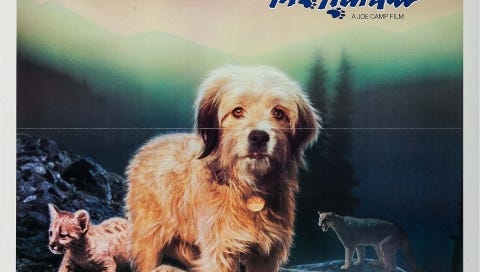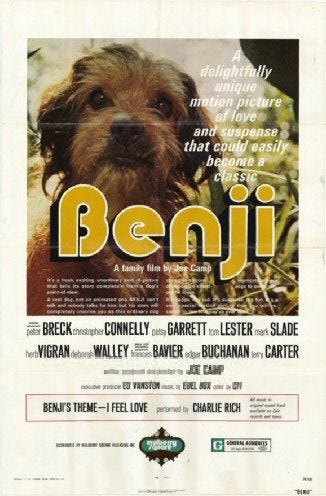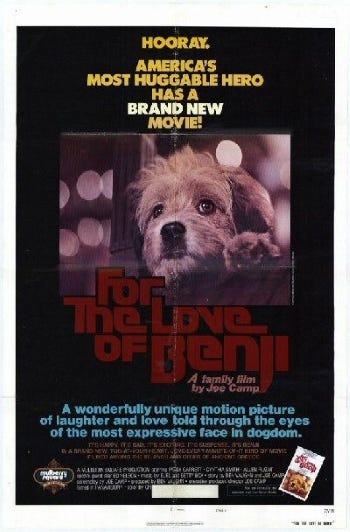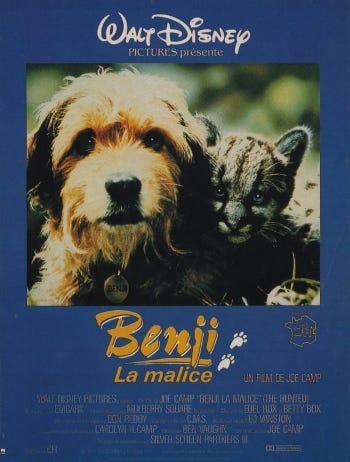As you stroll around a Disney theme park these days, you’re as likely to run into C-3PO, R2-D2 and the Marvel superheroes as you are Mickey, Goofy and Snow White. In a way, this slow march toward Disney becoming an acquirer of IP rather than a creator began in the 1980s. With live-action production taking a back seat, the studio became more of a distributor than a producer. If the opportunity arose to attach the Disney name to something with an existing fan base, so much the better. Which is why we need to turn our attention away from the Magic Kingdom for a moment to examine the phenomenon of Benji.
Benji was the brainchild (or, if you will, brain-dog) of Joe Camp, an advertising copywriter and frustrated filmmaker. Out of high school, Camp had wanted to attend the UCLA film school but was dissuaded by his parents, who wanted him to pursue a major that could land him a real job. But he never lost his passion for movies and even attempted to transfer to UCLA midway through his college career, although he ultimately wasn’t accepted.
In the early 1970s, Camp was living in Dallas and he noticed a big gap in the film world: the G-rated family picture. Disney was floundering in the wake of the deaths of Walt and Roy O. Disney, staying afloat primarily on the strength of reissues of decades-old films. Meanwhile, independents had rushed in to feed on the leftovers, releasing cheap nature movies and pseudo-documentaries through a practice known as four-walling. Basically, these indie distributors would rent out entire theatres, usually rundown old joints on their last legs, for a flat fee and keep 100% of the box office.
Recognizing a need for a well-produced, G-rated family film and inspired by Disney’s own Lady And The Tramp, Camp wrote and directed Benji, the story of a lovable stray mutt who rescues a couple of kidnapped children. Benji was played by Higgins, a rescue dog adopted by animal trainer Frank Inn who’d appeared in a number of TV shows throughout the ‘60s, most notably Petticoat Junction. Camp shopped his film around Hollywood for distribution but every studio turned him down, including Disney.
Camp decided to self-distribute Benji, forming his own company, Mulberry Square Releasing. However, he wasn’t interested in four-walling the picture and he really wasn’t interested in the low-rent theatres that indie films like his typically played in. He had his sights set higher and soon booked Benji into two of the best theatres in Dallas. He marketed the film aggressively, making personal appearances with Higgins/Benji. He followed a similar pattern wherever the movie played, touring the country and allowing the media to get to know and adore Benji.
By the end of the summer of 1974, Camp’s $500,00 movie had earned north of $5 million. Demand for the movie was still high but, realizing that ticket sales would drop now that kids were back in school, Camp decided to take another page from the Disney playbook and pull the movie out of theatres. He continued marketing Benji and brought it back into circulation at the beginning of the summer of ’75. Amazingly, Benji made even more money during its second go-around. Benji became a bona fide superstar.
Joe Camp was almost certainly a marketing genius but he was a middling-at-best filmmaker. His next movie, the slapstick comedy Hawmps!, didn’t do nearly as well, even though Camp hedged his bets by attaching a Benji short subject, Benji’s Life Story, and giving the dog a cameo in the feature. He jumped back into the Benji business with the 1977 sequel, For The Love Of Benji, with Higgins’ daughter, Benjean, taking over the role from her late dad, who had passed away in 1975 at the ripe old dog age of 17.
Everything was coming up Benji until 1980. Camp made a grave tactical error with his third Benji picture, Oh! Heavenly Dog. Chevy Chase starred as a private investigator who, after he’s killed on a case, is sent back to Earth in Benji’s body to solve his own murder. Turns out, nobody wanted to see Benji jumping into a bubble bath with Jane Seymour while supposedly possessed by a horny Chevy Chase. Critics hated it. Audiences hated it. Benji fans (of which I was one…I even had a Benji stuffed toy when I was a kid) hated it. Even Chevy Chase hated it. The movie pretty much ignored everything that had made the first two Benji movies work and it quickly died a merciful death at the box office.
After the debacle of Oh! Heavenly Dog, Camp brought Benji to television. The little guy learned to scuba dive for a special at Marineland and went sci-fi in the bizarre one-season wonder Benji, Zax & The Alien Prince, which aired on CBS. Eventually, Camp decided it was time to bring Benji back to his big-screen roots and that, finally, is where Disney re-enters the picture.
While the title Benji The Hunted suggests that this time our canine hero finds himself on the run from the law or bounty hunters or Cruella De Vil, the truth is a bit more prosaic. The movie starts on a bit of a meta note. Instead of playing the part of a scrappy, nomadic stray pup, Benji stars as Benji, the world-famous movie star. While shooting a scene for his new picture at sea, a storm hits that washes the poor dog overboard. Animal trainer Frank Inn (played by who else but animal trainer Frank Inn) fears the worst but holds out hope that Benji made it to shore and vows to embark on a thorough helicopter search just as soon as the weather clears.
Sure enough, our intrepid hero swims to the Oregon coast. It isn’t long before he encounters a female cougar on the hunt. Before he can ask the cougar for directions, she’s shot and killed by a hunter (country music star Red Steagall plays the film’s only major human character). A little later, he finds the cougar’s four now-orphaned cubs. Unable to attract the attention of Frank Inn’s helicopter, and because Benji’s gotta Benji, he decides to look after the cubs until he can find another mama cougar to adopt them.
I’m not going to go beat-by-beat into this story because that’s about all there is to Benji The Hunted. As you might expect, Benji encounters a wolf, a bear, an owl and is temporarily detained by the hunter, who hopes to claim the reward for finding him. If you’ve been with this column for awhile, you know we’ve already seen puh-lenty of movies just like this one back in the ‘50s and ‘60s.
None of which is meant to imply that Benji The Hunted is a bad movie. It’s actually a pretty decent example of its genre. The location photography by Don Reddy is gorgeous. And Benji didn’t become a superstar solely on the strength of Joe Camp’s marketing acumen. Benjean, like her father before her, is an incredibly expressive dog. Plenty of movie dogs can appear happy or sad. Benji can appear worried, determined, frustrated and even irritated or annoyed. Some of that is editing, of course, but all movie performances are constructed from editing to some extent. I’m not saying Benji needs to star in an all-dog version of Hamlet or anything but he’s a good little actor.
Because Benji is so expressive, Joe Camp is able to do something that Walt Disney never quite had the courage to do with his animal pictures. Not only are there precious few human characters, Camp dispenses with the crutch of voice-over narration altogether. The story is told entirely through the animals, the editing, the visuals and the music. And it’s a little surprising to realize just how unnecessary all that extra dialogue is. That alone makes Benji The Hunted somewhat unique among nature and animal movies.
Disney let Camp stay true to his Dallas roots by premiering Benji The Hunted in the city on June 5, 1987. It went wide two weeks later on the 19th. It did okay, earning around $15 million, but it didn’t become the word-of-mouth sensation that the original had. And while this would not seem to be the type of movie to inspire a lot of passionate critical debates, it did result in one of Siskel and Ebert’s most memorable arguments when an incredulous Gene Siskel couldn’t believe that Roger Ebert was giving a thumbs up to Benji The Hunted while giving Stanley Kubrick’s Full Metal Jacket a thumbs down.
Benji The Hunted was literally the only new movie to carry the Disney name in theatres in 1987. Once again, the studio kept the brand alive through a steady stream of re-releases: The AristoCats, Snow White and Cinderella all returned to theatres nationwide. For now anyway, the studio was putting most of its eggs in the Touchstone basket, a gamble that was paying off handsomely (and we’ll get to soon over on the Touchstone Plus-Or-Minus side of things).
When Disney agreed to work with Joe Camp and Mulberry Square, they may have held out hopes of acquiring the rights to the Benji franchise outright. That didn’t happen, at least in part because Benji had become Camp’s life work. He wasn’t willing to sign everything over that easily. Things were probably further complicated by a couple of lawsuits between Camp, Vestron Video and Disney over the video rights to Benji The Hunted. Disney had bigger fish to fry than trying to fully adopt a scrappy little dog, no matter how cute he was.
This would be Benjean’s final appearance as Benji. But Joe Camp and his family would continue trying to keep the franchise along with other dogs. In 2004, Camp released his final film, Benji: Off The Leash! In 2018, Camp’s son, Brandon, teamed up with Blumhouse Productions for the Netflix reboot Benji. Joe Camp passed away in March of 2024 at the age of 84 but I doubt very much that we’ve seen the last of Benji. You can’t keep a good dog down and, let’s face it, Benji is a very good dog, indeed.
VERDICT: At this risk of angering the ghost of Gene Siskel, I’m giving this a Disney Plus.









Really enjoyed your examination of Benji’s backstory. I actually liked Oh Heavenly Dog and saw it at the theater as well as home video shortly after. I thought the voiceover of Chase was matched well with Benji’s facial expressions. Plus this was during Chevy’s prime years of movies. Thanks, Adam!